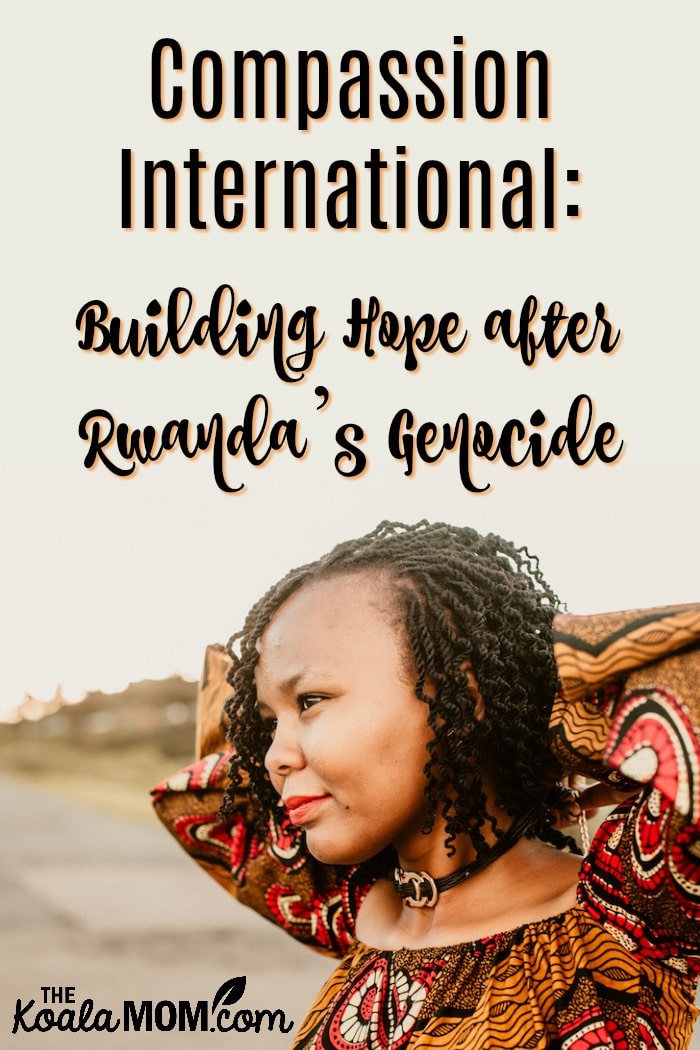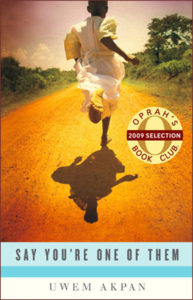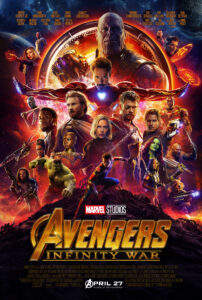In April of 1994, I had just turned ten years old. I wrote about my days in a blue diary, the first of many I would fill in the coming years. I spent my mornings doing school and my afternoons playing with my best friend down the road. I built Lego with my brothers and baked chocolate chip cookies with my mom.
In April of 1994, Christine was four years old. She spent two weeks hiding from rebels before watching them shoot her mother. For the next year, Christine lived with her aunt and grandparents. Her parents, her siblings and many of her friends were gone, killed by the Hutus in the Rwandan genocide. Then she was sponsored by Compassion International and her life turned around.

I don’t remember when I first heard about Rwanda. Maybe it was mentioned on the news that my dad listened to on the radio every morning. Maybe it came up in a prayer request at church. Maybe I didn’t really think about it until reading Say You’re One of Them by Uwem Akpan.
Genocide Then and Now
 This year marks the 25th anniversary of the genocide in Rwanda. And while it’s a country that has moved on, it’s a country still recovering from those events, with the help of organizations like Compassion International. For 100 days in 1994, Hutus slaughtered their Tutsi and Twa neighbours. Over 800,000 men, women and children were killed. A generation of children, like Christine, grew up without parents.
This year marks the 25th anniversary of the genocide in Rwanda. And while it’s a country that has moved on, it’s a country still recovering from those events, with the help of organizations like Compassion International. For 100 days in 1994, Hutus slaughtered their Tutsi and Twa neighbours. Over 800,000 men, women and children were killed. A generation of children, like Christine, grew up without parents.
The theme of genocide comes up in the latest Marvel Avengers movies. In Avengers: Infinity War, Thanos (an evil god-like figure from another planet) is on a quest to acquire the six Infinity Stones, which will give him ultimate power. He believes the entire universe is overpopulated. He’s made other planets better, in his opinion, by his unbiased destruction of 50% of the people.
The Avengers’ attempts to stop him fail, and Thanos does on earth what he’s done on other planets: wipes out half the population. Unlike the Rwandan genocide, when people were targeted for death based on their race, Thanos’ genocide favours none. In Avengers: End Game (coming out at the end of this month), the Avengers must figure out how to stop him—now that half of them are gone and Thanos has ultimate power.
 Infinity War and Endgame provide an interesting cultural commentary, a chance to discuss genocide with our teens. (I haven’t yet let the girls watch the Avengers movies, because of the violence and fighting in most of them.) Thanos’ smug belief that he’s making the world better by his genocide, and the Avengers’ horror of that and attempts to stop it, give us much food for thought, especially as the movie’s release coincides with the anniversary of the genocide in Rwanda.
Infinity War and Endgame provide an interesting cultural commentary, a chance to discuss genocide with our teens. (I haven’t yet let the girls watch the Avengers movies, because of the violence and fighting in most of them.) Thanos’ smug belief that he’s making the world better by his genocide, and the Avengers’ horror of that and attempts to stop it, give us much food for thought, especially as the movie’s release coincides with the anniversary of the genocide in Rwanda.
It’s important to remember Rwanda and to think about what happened there, because the ideas of Thanos seem to infect every century. Even now, I’ve seen news articles about the “problem” of “overpopulation” that sound dangerously close to what Thanos says. We need to raise up the Captain Marvels and Christines of our generation to fight for peace and for the protection of all life, regardless of race, religion, age or size.
Compassion Made a Difference for Christine
Today, Christine is a Child Protection Officer with Save the Children International. Thanks to Compassion International, she was able to attend school. She now has a degree in political science from Rwanda National University. She has worked with the Rwanda parliament in the senate. She’s also accepted Jesus into her life and forgiven those who murdered her parents.
“My life would be a lot different if I did not have Compassion International. I have grown in Christ through Compassion. Today, I’m able to give back to my country. Helping people in need is what I love to do. I would like to be a servant leader as Jesus was. I have a dream of one day being the Minister for Human Rights.” ~ Christine, former sponsored child
Compassion International works with local churches in countries such as Rwanda to break the cycle of poverty and bring hope. In Rwanda, Compassion is providing trauma counselling to those affected by the genocide. Time alone doesn’t always heal wounds; many are still dealing with the emotional, mental and physical consequences of those 100 days. Compassion offers concrete solutions in the form of counselling, school supplies, clothing and more.
How Compassion International Helps
It’s easy to look at Rwanda and feel like the problem is too big. How do we, in our safe, snug homes in North America, make a difference in a war-torn African country? My answer, and Compassion International’s, is one child at a time.
Each of us can make a difference in the life of one other person, one other child. That child can make a difference in the lives of others, as Christine is now. It took one person sponsoring her through Compassion International to change her life when she was five years old. Now she’s changing the lives of many others.
Sponsoring a child is a great way to teach our children about giving and what’s happening in third world countries. In 1996, I asked my parents if I could sponsor a child in India. They weren’t sure I’d be able to pay the monthly dues. At first, they suggested my brothers could help pay every third or fourth month. That never happened.
For the next ten years, I paid Nasreen’s sponsorship dues. I wrote her letters regularly and dreamed of someday visiting her. Instead, when she was sixteen and I was twenty-two, her family moved. I lost touch with her and I still wonder what happened to her, where she is today.
Right now, my mom sponsors two children with Compassion International. One of her sponsored kids is in Rwanda and she’s travelling there this summer to visit. I’m looking forward to hearing about her experience and seeing her pictures.
To learn more about Compassion International’s work in Rwanda and help fund trauma counselling, visit their website. You can also follow Compassion on Facebook, Twitter and YouTube.
What do you know about the Rwanda genocide? Have you ever sponsored a child in a third-world country? How do you think we can make a difference in places like Rwanda?
Image credit: Compassion International. This post was not compensated in any way; all opinions expressed are my own.


No Responses Yet